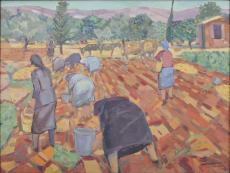


Lefteris Economou was born into a family of farmers and lived at home until the age of 18. He thus developed strong links to the agrarian
world of Cyprus. Later on, in London, he was frequently obliged to work in order to finance his studies, seeking employment in factories and restaurants and even as a railway porter. In this way, he became intimately familiar with the harsh daily life of the poor people in the countryside and the big cities. These life experiences fuelled his subject matter, as well as his love of such artists as Jean-François Millet and Vincent van Gogh.
As a student in London, Economou drew his themes mostly from the daily life of the people he met at the places where he worked. These compositions link him to the group of British realist painters who, following World War II, concentrated on the depiction of subjects taken from the life of the working class and the broader social issues of post-war Europe. Economou’s interest in the life of the poor breadwinner continued in Cyprus. Inevitably, his reconnection to the island’s agrarian world provided him with a large part of his subject matter. Economou painted The Potato Harvest in Zodia in 1959 and presented it at his solo exhibitions in 1960 and 1962. He painted it from nature, as he did almost all of his works, in the village of Zodia.
It is a well-known fact that he travelled on a daily basis, carrying with him his easel and paints. In his exhibition catalogues he was wont to also mention the geographical origin of his subjects, and so we know that the artist scoured Cyprus in search of themes – on the plains, on the mountains and by the sea. He therefore had the opportunity to study the peculiarities and the distinct character of each place.
In The Potato Harvest in Zodia, Economou moved away from Trikomo – The House of Dighenis (AGLG. 464) and made evident his intention to further pursue his research to become better acquainted with the Cypriot environment. By maintaining the geometrical organisation of space, his colour appears more expressionistic and his brushstroke more gestural. The painting exudes more emotion, though it remains under the tight rein of cognition. Below the southern sun, Economou’s colours become brighter and his atmosphere clearer. Observing the methods of the Impressionists, he omitted shadows and translated colour-related visual stimuli. The women gathering potatoes are rendered with convincing naturalness, while their biomorphic forms converse harmoniously with the chromatic, geometrical rendering of the field.
Lefteris Economou studied art in London, at St Martins School of Art (1949-1950), the John Cass School of Art (1950-1954) and Goldsmiths College of the University of London (1954-1955). In 1955 he was appointed as an art teacher in the high schools of Cyprus, a post he maintained until his retirement. Economou first appeared on the art scene in 1952 when he took part in a group exhibition in London, and he remained consistently active in the art world thereafter. He was interested in all subjects, including landscape, portraiture, genre painting and still-life compositions, and his work reveals the strong influence of Impressionism and Post-Impressionism. In some of his most important pieces, he synthesized free-form and precise shapes in a distinctive manner, fusing different styles of drawing. He wrote and illustrated books, which he published himself; he favoured large surfaces in his printmaking and also painted many large murals. His engravings are notable for their sharply drawn features and overall high quality.